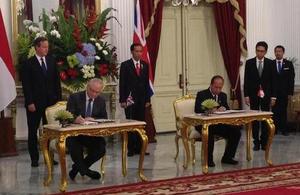Prime Minister announces space partnerships with south-east Asia
UK space technology to tackle world’s $20 billion illegal fishing trade. UK and Indonesian Space Agencies increase collaboration.

The UK’s expertise in space technology and applications could soon be used to assist in efforts to combat illegal fishing, and to help the Indonesian government harness space technology for important services such as disaster management and land use monitoring.
The new partnerships were announced today (27 July 2015) by the Prime Minister during his visit to south-east Asia.
Tasking satellites in the fight against illegal fishing
The UK Space Agency is funding a project between Spire UK and Singapore’s Economic Development Board to develop and test a novel product that will allow fishing authorities, NGO’s and coastal guards to easily detect and track illegal fishing – a common problem in developing nations, posing a real threat to ecosystems and coastal economies. The project worth £1.6 million could grow into a constellation of up to 50 nanosatellites that would be built in Glasgow.
Through this initial collaboration, it is hoped that this work can be taken forward with other countries in the region, such as Indonesia.
Illegal fishing results in over $20 billion of lost revenues annually, predominantly for developing nations. In areas where overfishing and illegal fishing are most prevalent, over 3 billion people depend on fish as their primary source of protein. Monitoring small vessels such as fishing boats via conventional monitoring systems is challenging due to cost and potential manipulation by ship operators. Governments have started turning to Automatic Identification System (AIS) - a ship-to-ship and ship-to-shore system used as an aid for collision avoidance and vessel traffic management - but that system still requires technological improvement.
The new project, funded through the UK Space Agency’s International Partnerships in Space Programme, will be based on AIS and will include a novel system based on dual antennas, dual receivers, and advanced signal analytics on nano-satellites.
Increased collaboration
The UK Space Agency’s MoU with the Indonesian Space Agency (LAPAN) will see the UK and Indonesia increase collaboration in civil space activities such as Earth observation. It will also position UK companies, such as SSTL which is already working with Indonesia, as potential providers of space technology beneficial to the Indonesian Government.
As part of the world’s largest archipelago, Indonesia has many needs for the monitoring services that can be supplied by satellites, particularly in the areas of maritime, land use and disaster management. Additionally, Indonesia is looking to develop its own remote sensing capability – an invaluable tool in areas such as the monitoring of fishing vessels and crop growth.
The MoU will also see the UK share expertise and help Indonesia develop training in areas such as infrastructure building and data interpretation. The first UK-Indonesia workshop was held directly after the MoU signing and included a host of UK companies that shared their knowledge in the uses of satellites for maritime monitoring.